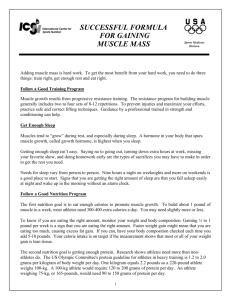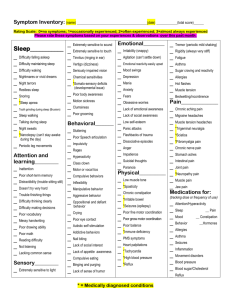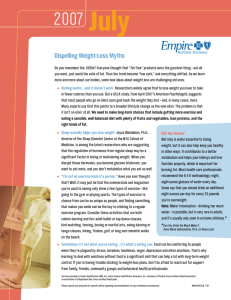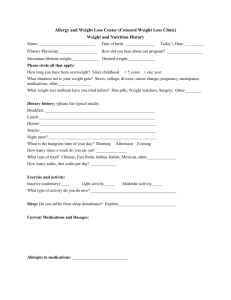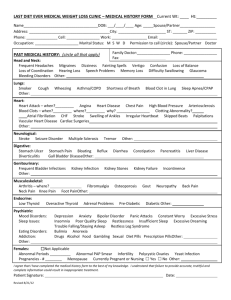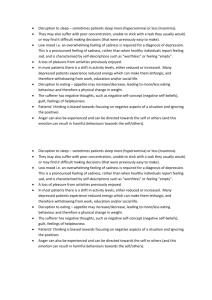MedAire Wellness Tips
advertisement
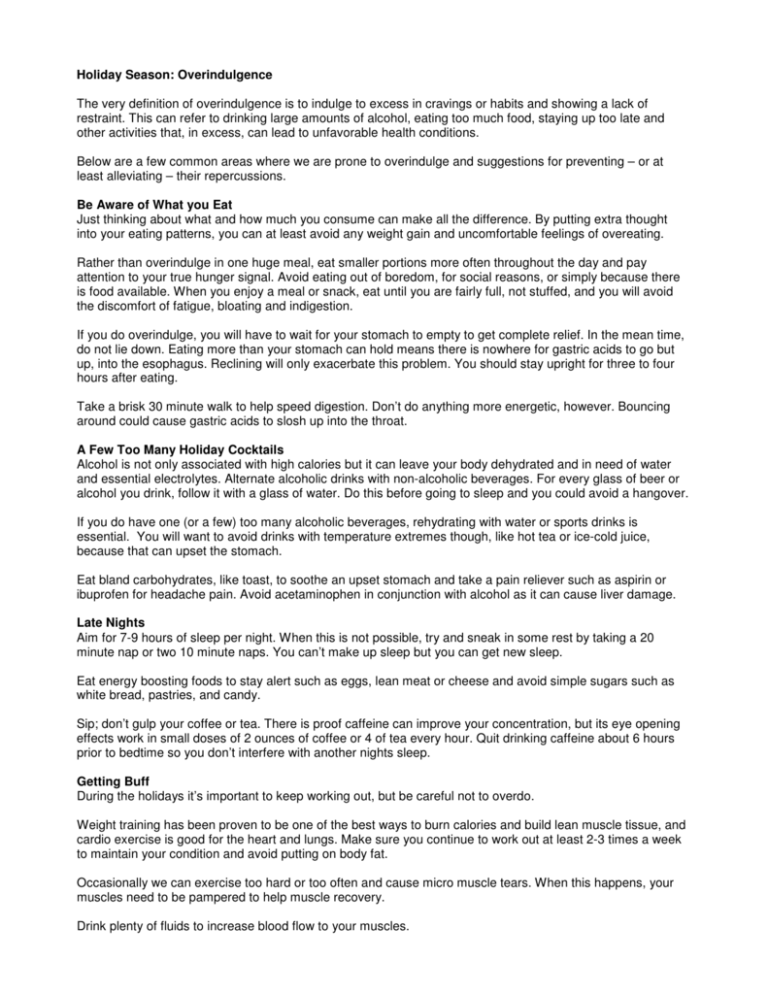
Holiday Season: Overindulgence The very definition of overindulgence is to indulge to excess in cravings or habits and showing a lack of restraint. This can refer to drinking large amounts of alcohol, eating too much food, staying up too late and other activities that, in excess, can lead to unfavorable health conditions. Below are a few common areas where we are prone to overindulge and suggestions for preventing – or at least alleviating – their repercussions. Be Aware of What you Eat Just thinking about what and how much you consume can make all the difference. By putting extra thought into your eating patterns, you can at least avoid any weight gain and uncomfortable feelings of overeating. Rather than overindulge in one huge meal, eat smaller portions more often throughout the day and pay attention to your true hunger signal. Avoid eating out of boredom, for social reasons, or simply because there is food available. When you enjoy a meal or snack, eat until you are fairly full, not stuffed, and you will avoid the discomfort of fatigue, bloating and indigestion. If you do overindulge, you will have to wait for your stomach to empty to get complete relief. In the mean time, do not lie down. Eating more than your stomach can hold means there is nowhere for gastric acids to go but up, into the esophagus. Reclining will only exacerbate this problem. You should stay upright for three to four hours after eating. Take a brisk 30 minute walk to help speed digestion. Don’t do anything more energetic, however. Bouncing around could cause gastric acids to slosh up into the throat. A Few Too Many Holiday Cocktails Alcohol is not only associated with high calories but it can leave your body dehydrated and in need of water and essential electrolytes. Alternate alcoholic drinks with non-alcoholic beverages. For every glass of beer or alcohol you drink, follow it with a glass of water. Do this before going to sleep and you could avoid a hangover. If you do have one (or a few) too many alcoholic beverages, rehydrating with water or sports drinks is essential. You will want to avoid drinks with temperature extremes though, like hot tea or ice-cold juice, because that can upset the stomach. Eat bland carbohydrates, like toast, to soothe an upset stomach and take a pain reliever such as aspirin or ibuprofen for headache pain. Avoid acetaminophen in conjunction with alcohol as it can cause liver damage. Late Nights Aim for 7-9 hours of sleep per night. When this is not possible, try and sneak in some rest by taking a 20 minute nap or two 10 minute naps. You can’t make up sleep but you can get new sleep. Eat energy boosting foods to stay alert such as eggs, lean meat or cheese and avoid simple sugars such as white bread, pastries, and candy. Sip; don’t gulp your coffee or tea. There is proof caffeine can improve your concentration, but its eye opening effects work in small doses of 2 ounces of coffee or 4 of tea every hour. Quit drinking caffeine about 6 hours prior to bedtime so you don’t interfere with another nights sleep. Getting Buff During the holidays it’s important to keep working out, but be careful not to overdo. Weight training has been proven to be one of the best ways to burn calories and build lean muscle tissue, and cardio exercise is good for the heart and lungs. Make sure you continue to work out at least 2-3 times a week to maintain your condition and avoid putting on body fat. Occasionally we can exercise too hard or too often and cause micro muscle tears. When this happens, your muscles need to be pampered to help muscle recovery. Drink plenty of fluids to increase blood flow to your muscles. Take a long walk. This indirectly will help muscle tears heal by increasing blood flow. Gently stretch the specific areas that hurt. Avoid bouncing when stretching. Slowly lengthen the sore muscle and hold the position for at least ten seconds. Get a massage and instruct the therapist to ease into the sore muscles, rather than assaulting them right off with deep tissue treatment. While we all like to indulge in life's pleasures, it's easy to overdo it. By identifying areas where we are prone to overindulge, and being aware of our actions, we can avoid some of the negative side effects and enjoy our (moderate) indulgences so much more. By: Lene’ Hulse, RN, BSN, CEN of MedAire. MedAire provides medical advice, training, and medical equipment for crew at sea and ashore.

